What is artificial intelligence and how is it transforming the world of work?
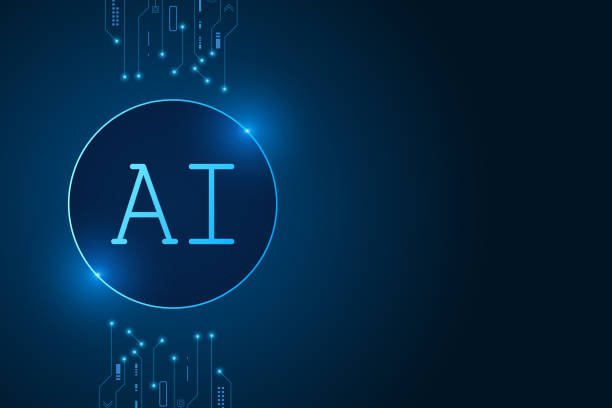
What is artificial intelligence and how is it transforming the world of work?
Artificial intelligence (AI) is a branch of computer science dedicated to building machines that can perform tasks that typically require human intelligence.
These tasks include learning, problem-solving, pattern recognition, and natural language understanding.
AI is rapidly advancing and has a profound impact on various industries and the #future_of_work.
Automation, increased productivity, and the creation of new job opportunities are just some of these transformations.
In recent years, there have been significant advances in areas such as Machine Learning and Neural Networks, enabling the development of more complex and powerful AI systems.
These systems can analyze large amounts of data and identify patterns that are difficult or impossible for humans.
AI is currently used in various fields such as healthcare, finance, transportation, and manufacturing.
In healthcare, AI is used to diagnose diseases, develop new drugs, and provide more personalized medical care.
In finance, AI is used to detect fraud, manage risk, and provide automated financial services.
In transportation, AI is used to develop self-driving cars, optimize routes, and reduce traffic.
In manufacturing, AI is used to automate processes, improve product quality, and reduce costs.
Wikipedia Artificial Intelligence can provide more information in this field.
The impact of AI on the future of work AI is undeniable.
Some jobs are being fully automated, while new jobs are being created that require new skills.
For example, with the development of self-driving cars, the need for truck and taxi drivers is decreasing, but the need for AI engineers, data scientists, and robotics technicians is increasing.
Therefore, people need to keep their skills up to date and prepare for the changes brought about by AI.
Don’t have a company website yet and are missing out on online opportunities? With a professional corporate website design by Rasaweb,
✅ Double the credibility of your business
✅ Attract new customers
⚡ Free consultation for your company website!
Emerging job opportunities in the age of artificial intelligence
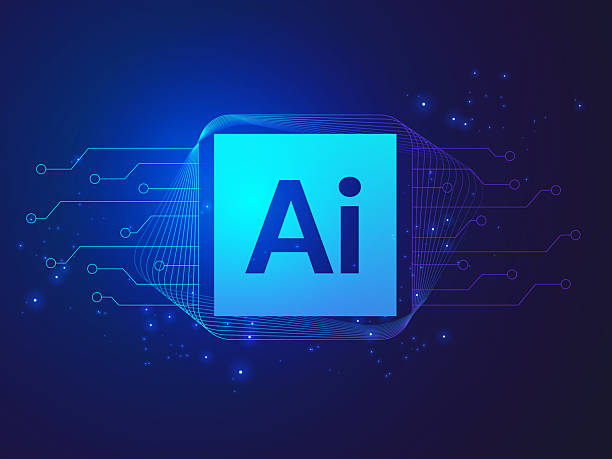
Emerging job opportunities in the age of artificial intelligence
AI is not only a threat to some traditional jobs but also creates new and exciting job opportunities.
With the advancement of technology, the need for specialists who can design, develop, implement, and manage AI systems has increased dramatically.
Some of these emerging job opportunities include:
- AI Engineers: These individuals are responsible for designing, developing, and implementing AI algorithms and models.
They should have in-depth knowledge of machine learning, neural networks, and natural language processing. - Data Scientists: Data scientists are responsible for collecting, analyzing, and analyzing data.
They use various tools and techniques to extract valuable information from data and help organizations make better decisions. - AI Ethics Specialists: With the increasing use of AI, concerns about ethical issues such as discrimination, privacy, and security have increased.
AI ethics specialists are responsible for ensuring that AI systems are developed and used fairly and responsibly. - Robotics Technicians: Robotics technicians are responsible for installing, repairing, and maintaining robots and automation systems.
They should have technical knowledge in the fields of electronics, mechanics, and programming. - Human-Computer Interaction Specialists: These individuals are responsible for designing user interfaces (UI) and user experiences (UX) that make AI systems easier and more enjoyable for users.
These are just a few examples of the emerging job opportunities that have been created in the age of AI.
To take advantage of these opportunities, people need to keep their skills up to date and be prepared to learn new skills.
Artificial Intelligence Courses on Coursera can be useful for learning.
Awareness of the future of work AI and striving to acquire related skills can guarantee your future.
Essential skills for success in future AI-based jobs
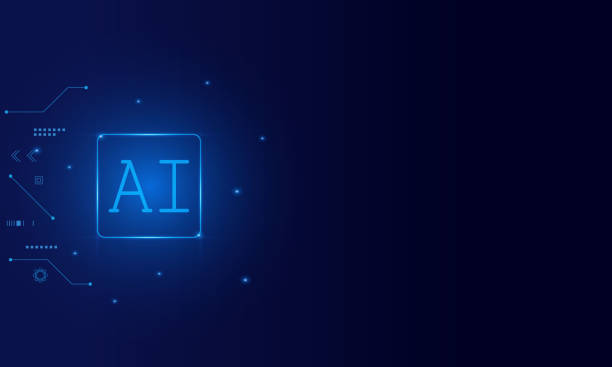
Essential skills for success in future AI-based jobs
To succeed in future jobs that increasingly rely on AI, it is essential to have specific skills.
These skills include technical skills and soft skills.
Technical skills include knowledge in machine learning, neural networks, natural language processing, and data science.
Soft skills include problem-solving, critical thinking, creativity, communication, and collaboration skills.
Here is a table that shows the essential skills for future AI-based jobs:
| Skill | Description |
|---|---|
| Machine Learning | Ability to design and implement machine learning algorithms |
| Neural Networks | In-depth knowledge of the structure and function of neural networks |
| Natural Language Processing | Ability to process and understand natural language |
| Data Science | Ability to collect, analyze, and analyze data |
| Problem Solving | Ability to identify and solve complex problems |
| Critical Thinking | Ability to evaluate information and make informed decisions |
| Creativity | Ability to generate new and innovative ideas |
| Communication | Ability to communicate effectively with others |
| Collaboration | Ability to work in a team and collaborate with others |
In addition to these skills, individuals must be prepared for continuous learning and adaptation to change.
AI is rapidly advancing, and individuals need to keep their skills up to date to remain competitive in the labor market.
Awareness of AI-related news can be of great help to you.
The future of work in AI is very bright.
However, to succeed in this field, individuals must acquire the necessary skills and prepare for the challenges ahead.
Challenges facing the workforce in the age of automation and artificial intelligence
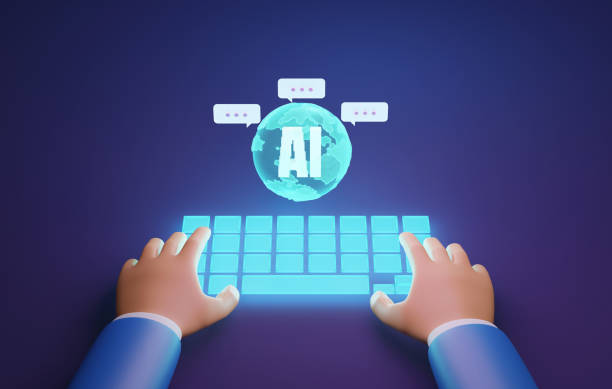
Challenges facing the workforce in the age of automation and artificial intelligence
With the expansion of automation and AI, the workforce faces many challenges.
One of the biggest challenges is the loss of traditional jobs.
With the automation of processes and the replacement of human labor with machines, many low-skilled and repetitive jobs are at risk.
This can lead to increased unemployment and economic inequality.
Another challenge is the need for new skills.
As technology advances, the skills needed for different jobs change.
People need to learn new skills to remain competitive in the labor market.
This can be difficult for people with limited access to education and resources.
In addition, there are ethical issues.
With the increasing use of AI, concerns about discrimination, privacy, and security have increased.
It must be ensured that AI systems are developed and used fairly and responsibly.
The AI Ethics Center at the University of Berkeley addresses this important issue.
To address these challenges, governments, organizations, and individuals must work together.
Governments should adopt policies that protect the workforce from the negative effects of automation and create new educational and employment opportunities.
Organizations should invest in the training and development of their workforce and ensure that AI systems are used fairly and responsibly.
Individuals should also keep their skills up to date and be prepared to learn new skills.
With proper management, the challenges facing the workforce in the age of automation and artificial intelligence can be transformed into opportunities for growth and progress.
AI can increase productivity, create new jobs, and improve the quality of life.
The key to success is being prepared for change and continuous learning.
The future of work in AI requires people who can adapt to new conditions.
Does your current website create the trust that potential customers should have in your business? If the answer is no, it’s time to have a professional and impactful company website with Rasaweb.
✅ Completely custom design tailored to your brand identity
✅ Increase lead attraction and the credibility of your business in the eyes of customers⚡ Contact us for a free consultation!
The role of education in preparing the workforce for the age of artificial intelligence
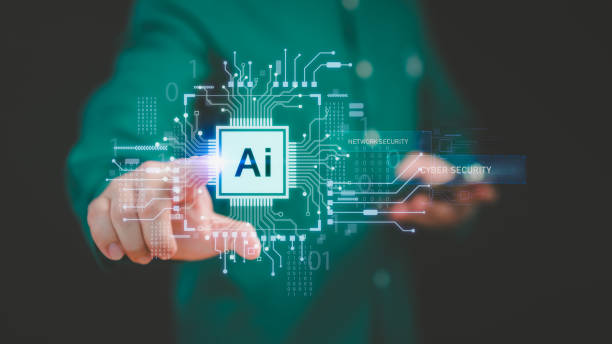
The role of education in preparing the workforce for the age of artificial intelligence
Education plays a vital role in preparing the workforce for the age of artificial intelligence.
Education systems need to be updated to teach students the skills needed for future jobs.
These skills include technical skills (such as programming, data science, and machine learning) and soft skills (such as problem-solving, critical thinking, creativity, and communication).
In addition, education should emphasize lifelong learning.
AI is rapidly advancing, and individuals need to keep their skills up to date to remain competitive in the labor market.
Education systems should provide opportunities for continuous learning and professional development.
Education should also address the ethical issues related to AI.
Students should be aware of discrimination, privacy, and security and learn how to develop and use AI systems fairly and responsibly.
Learning about the future of work in AI and related ethical issues can give people a better perspective.
To create a skilled workforce ready for the age of AI, more investment must be made in education.
Governments, organizations, and individuals must work together to update education systems, create new educational opportunities, and support lifelong learning.
Learning AI-related skills at University of Berkeley can be a good starting point.
By investing in education, we can ensure that the workforce is prepared for the challenges and opportunities of the age of AI.
This not only contributes to economic growth but also helps to create a more just and sustainable society.
Industries most affected by artificial intelligence
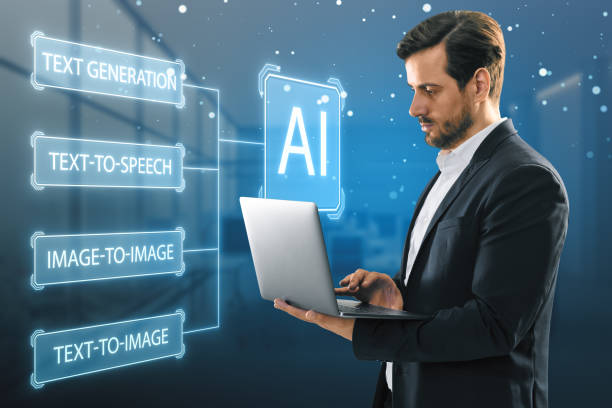
Industries most affected by artificial intelligence
AI is already having a profound impact on various industries, and this impact is expected to increase in the coming years.
Some of the industries most affected by AI include:
- Healthcare: AI is currently used in diagnosing diseases, developing new drugs, and providing more personalized medical care.
AI is predicted to play an increasingly important role in the future of healthcare. - Finance: AI is currently used in fraud detection, risk management, and automated financial services.
AI is predicted to play an increasingly important role in the future of finance. - Transportation: AI is currently used in the development of self-driving cars, route optimization, and traffic reduction.
AI is predicted to play an increasingly important role in the future of transportation. - Manufacturing: AI is currently used in process automation, product quality improvement, and cost reduction.
AI is predicted to play an increasingly important role in the future of manufacturing. - Retail: AI is currently used in personalizing the customer shopping experience, optimizing the supply chain, and providing automated customer service.
AI is predicted to play an increasingly important role in the future of retail.
These are just a few examples of the industries most affected by AI.
AI is transforming all industries, and organizations need to be prepared for these changes.
To ensure the necessary readiness, one must be aware of the future of work in AI.
Organizations should invest in AI, train their workforce, and promote a culture of innovation.
By doing these things, organizations can benefit from AI and remain competitive in the labor market.
Expected changes in the organizational structure of companies with the expansion of artificial intelligence
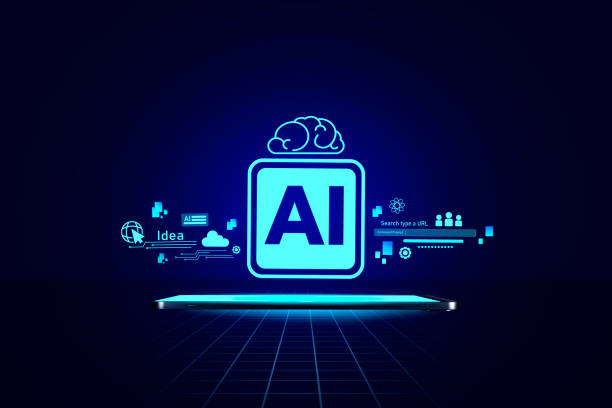
Expected changes in the organizational structure of companies with the expansion of artificial intelligence
The expansion of AI will lead to significant changes in the organizational structure of companies.
One of these changes is the reduced need for human labor in some sectors.
By automating processes and replacing human labor with machines, companies can achieve the same level of production and productivity with less human labor.
This can lead to downsizing organizations and eliminating some management layers.
Another change is the increased importance of the role of AI and data specialists.
Companies need skilled professionals to design, develop, implement, and manage AI systems.
This can lead to the creation of new departments within organizations that specifically focus on AI and data.
In addition, companies must promote a culture of innovation.
AI is rapidly advancing, and companies must be prepared to adapt to change.
This requires creating an organizational culture that welcomes experimentation, learning, and innovation.
Here is a table that shows the expected changes in the organizational structure of companies with the expansion of artificial intelligence:
| Change | Description |
|---|---|
| Reduced need for human labor | Process automation and replacement of human labor with machines |
| Increased importance of the role of AI and data specialists | Need for skilled professionals to design, develop, implement, and manage AI systems |
| Creation of new departments focused on AI | Creating departments that specifically focus on AI and data |
| Promoting a culture of innovation | Creating an organizational culture that welcomes experimentation, learning, and innovation |
| Change in management structure | Eliminating management layers and creating flatter organizational structures |
Organizations need to be prepared for these changes and adjust their strategies accordingly.
By doing these things, organizations can benefit from AI and remain competitive in the labor market.
A correct understanding of the future of work in AI helps organizations in optimal decision-making.
The impact of AI on salaries and wages in the future
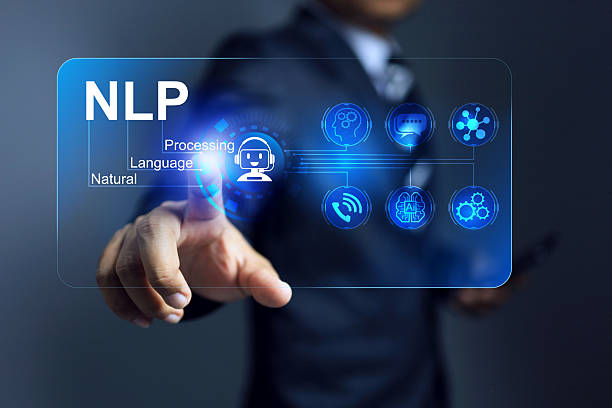
The impact of AI on salaries and wages in the future
AI can have a significant impact on salaries and wages in the future.
With the automation of low-skilled and repetitive jobs, salaries and wages in these jobs are expected to decrease.
In contrast, with the increasing demand for AI and data specialists, salaries and wages in these jobs are expected to increase.
In addition, AI can lead to increased economic inequality.
People who have the skills needed for future jobs can earn higher salaries and wages, while people who lack these skills may face lower salaries and wages or even lose their jobs.
To reduce the negative effects of AI on salaries and wages, governments should adopt policies that protect the workforce from the negative effects of automation and create new educational and employment opportunities.
These policies should be such that they guarantee the future of work in AI for all members of society.
In addition, organizations should invest in the training and development of their workforce and ensure that their employees have the skills needed for future jobs.
Individuals should also keep their skills up to date and be prepared to learn new skills.
For information about salaries and wages, you can visit Salary.com.
With proper management, the negative effects of AI on salaries and wages can be prevented, and its benefits can be enjoyed by all members of society.
Are you disappointed with the low conversion rate of your online store?
Rasaweb is your definitive solution with a professional online store design!
✅ Increase your sales and income
✅ A unique user experience for your customers
⚡ Get a free consultation right now!
Solutions for adapting to labor market changes caused by artificial intelligence
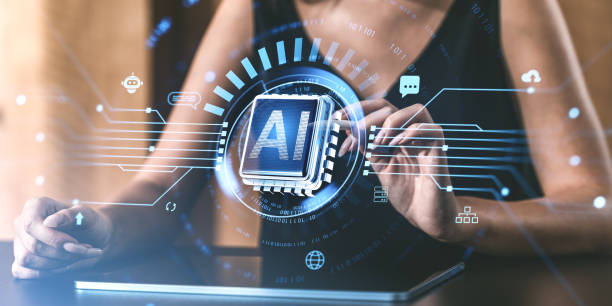
Solutions for adapting to labor market changes caused by artificial intelligence
To adapt to the labor market changes caused by AI, individuals and organizations must adopt various solutions.
Some of these solutions include:
- Continuous learning: Individuals must keep their skills up to date and be prepared to learn new skills.
This may include attending training courses, reading books and articles, and attending conferences and seminars. - Developing soft skills: In addition to technical skills, individuals must also develop their soft skills.
These skills include problem-solving, critical thinking, creativity, communication, and collaboration skills. - Changing jobs: In some cases, it may be necessary for individuals to change jobs.
This may include changing to a new job in the same industry, or changing to a new job in a different industry. - Entrepreneurship: People can start their own business.
This can create new job opportunities and allow individuals to have more control over their career destiny. - Investing in training and development: Organizations should invest in the training and development of their workforce and ensure that their employees have the skills needed for future jobs.
- Promoting a culture of innovation: Organizations should promote a culture of innovation.
This requires creating an organizational culture that welcomes experimentation, learning, and innovation.
By adopting these solutions, individuals and organizations can adapt to the labor market changes caused by AI and benefit from new opportunities.
Preparing for the future of work in AI requires effort and planning.
The future of AI jobs in Iran: perspectives and challenges
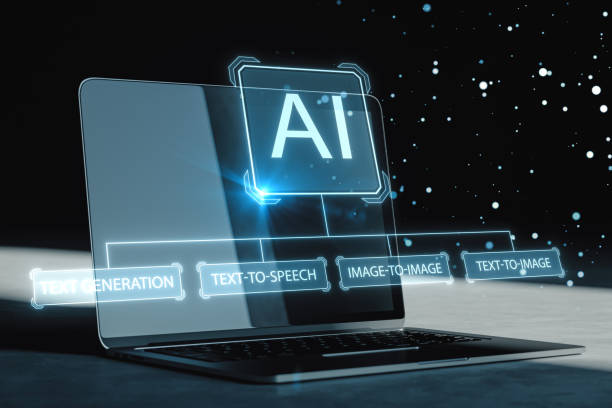
The future of AI jobs in Iran: perspectives and challenges
The future of AI jobs in Iran has bright prospects.
Given the high potential of AI in various industries, demand for AI specialists in Iran is expected to increase in the coming years.
This can create new job opportunities for university graduates, IT professionals, and entrepreneurs.
However, the future of AI jobs in Iran also faces challenges.
One of these challenges is the shortage of skilled labor.
To develop the AI industry in Iran, more investment must be made in education and new educational opportunities must be created for AI specialists.
Another challenge is the lack of necessary infrastructure.
To develop AI, the necessary infrastructure must be provided, such as access to big data, high computing power, and high-speed internet.
In addition, there are legal and ethical issues.
Laws and regulations must be put in place to regulate the use of AI fairly and responsibly.
The Electronic Commerce Development Center can play an important role in this regard.
By overcoming these challenges, Iran can benefit from AI and become an innovation hub in the region.
To achieve this goal, the government, universities, and organizations must work together and create a suitable ecosystem for the development of AI.
Finally, the future of work in AI in Iran requires a comprehensive plan and cooperation between different sectors.
Frequently Asked Questions
| Question | Answer |
|---|---|
| What impact will AI have on the future labor market? | AI automates repetitive jobs, but at the same time it will create new and more complex jobs in areas such as the development, maintenance and training of AI systems. |
| Which jobs are most at risk of being replaced by AI? | Jobs that involve repetitive, rule-based tasks with little need for creativity or emotional intelligence, such as some manufacturing, data entry, and simple customer service jobs, are most at risk. |
| What skills are essential for success in a future career with AI? | Skills such as critical thinking, complex problem solving, creativity, emotional intelligence, data literacy, the ability to work with AI, and lifelong learning are of great importance. |
| Will AI cause widespread unemployment? | Some jobs will disappear, but history has shown that new technologies, instead of widespread unemployment, reshape the labor market and create new jobs. The need for adaptation and retraining is important. |
| What new job opportunities are emerging with the rise of AI? | Jobs such as machine learning engineer, data scientist, AI ethicist, human-AI interaction designer, and digital transformation consultant are among the new opportunities. |
| What is the role of education in preparing for a future career with AI? | Education should focus on developing soft skills, computational thinking, digital literacy, and the ability to learn continuously to prepare people for future changes. |
| How can I prepare myself for labor market changes caused by AI? | You can prepare yourself by learning new skills related to AI and data, strengthening soft skills, developing critical thinking and creativity, and getting used to lifelong learning. |
| Will AI ethics become an important field of work? | Yes, given the increasing concerns about biases, privacy, and automated AI decision-making, the role of AI ethics experts will be critical to ensuring its responsible development. |
| What is the importance of human and AI collaboration in the future of work? | Instead of competition, human and AI collaboration shapes the future of the labor market. AI can be a tool to increase productivity and focus human efforts on more complex and creative tasks. |
| Which industries will be most affected by AI? | Almost all industries will be affected, but areas such as healthcare, finance, transportation, manufacturing, education, and customer service are pioneers in adoption and transformation by AI. |
And other services of Rasa Web advertising agency in the field of advertising
Smart marketing automation: A fast and efficient solution for user interaction with a focus on SEO-based content strategy.
Smart customer journey map: An innovative platform to improve campaign management with marketing automation.
Smart conversion rate optimization: A fast and efficient solution to increase sales by focusing on optimizing key pages.
Smart digital advertising: A combination of creativity and technology to increase click-through rate by managing Google Ads.
Smart advertising campaign: A fast and efficient solution to analyze customer behavior with a focus on marketing automation.
And more than hundreds of other services in the field of internet advertising, advertising consulting and organizational solutions
Internet advertising | Advertising strategy | Advertorial
Resources
Artificial intelligence and the future of work: opportunities and challenges
,Artificial Intelligence, Entrepreneurship Market and Startup Businesses
,Artificial Intelligence (AI): How It Works, Benefits, Industries & Risks
,5 tech trends that will shape our world in the next decade
? Rasa Web Afrin Digital Marketing Agency, by providing comprehensive and innovative solutions, paves the way for the growth and brilliance of your business in the digital world. From designing a website with a modern user interface and search engine optimization to targeted advertising campaigns, we are committed to building a bright future for your brand.
📍 Tehran, Mirdamad Street, next to the Central Bank, Southern Kazerun Alley, Ramin Alley No. 6



